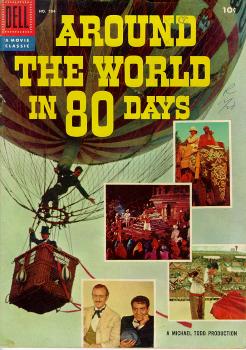
There were some rich portrayals of the Indian subcontinent and the American west. He painted a vivid backdrop upon which he laid down Fogg’s adventures. Verne’s vast research enabled him to capture the essence of his time. The story was propelled by the thrill and the mystique of adventure and exploration, the yearning for the curious, strange, and unknown. “But what then? What had he really gained by all this trouble? What had he brought back from this long and weary journey? Nothing, say you? Perhaps so nothing but a charming woman, who, strange as it may appear, made him the happiest of men! Truly, would you not for less than that make the tour around the world?” ~ Jules Verne, Around the World in Eighty Days As a matter of fact, Fogg’s wager originated from the result of a fairly recent development (in reference to the story’s period) – the opening of a new railway station in India which, according to The Daily Telegraph, made it possible to travel around the world in 80 days. The primary modes of transport used by Fogg and his company – the train and the steamer – were all offshoots of these advancement. The novel celebrated the technological advances of the industrial revolution. Whilst it was inevitable, it is ironic that these advancements led to the decline in the number of places, tribes, and lands to be discovered. The advent of the internet and commercial flights made the world even smaller. Verne underlined the importance of the perpetual growth of technology and how it impacts the way we view the world. The advancement of technology and the advent of the industrial revolution made the seemingly impossible possible. Packaged as a typical period adventure novel, the novel aims to underline how the world is slowly becoming much smaller. Despite this seemingly simple premise, Verne’s visionary writing and intricate research were spectacularly exemplified.Īround the World in Eighty Days is more than just an adventure novel propped with some details of mystery and suspense. In Around the World in Eighty Days, Verne threaded a very quotidian premise – an adventure novel that explores possibility of travelling around the world in eighty days.
#Novel around the world in 80 days series#
His expansive 54-book Voyages extraordinaires (The Extraordinary Voyages) series is a testament to his extensive research. Jules Verne is widely regarded as one of the pillars of travel writing.

Will Fogg and Passepartout succeed in their quest? Will Detective Fix stymie their progress? From London to Suez Canal, to India, to Japan, to the United States, the peripatetic narrative that takes the readers across the globe. As Detective Fix was unable to obtain a warrant of arrest in time, he was forced to go along with the journey, keeping a tab on the duo. Hot on the duo’s heels is Detective Fix, a Scotland Yard detective who was dispatched from London to capture a bank robber whose profile matched that of the reclusive Fogg’s. “He lived alone, and, so to speak, outside of every social relation and as he knew that in this world account must be taken of friction, and that friction retards, he never rubbed against anybody.” ~ Jules Verne, Around the World in Eighty Days With careful calculation, the duo endeavors to complete the task on or before December 21. Fogg leads a life dictated by mathematical precision so at exactly 8:45 PM on October 2, he and Passepartout departed from London. Passepartout’s predecessor was dismissed for bringing Fogg a shaving water at 84 degrees Fahrenheit, two degrees lower than Fogg’s requirement. In exchange for successfully circumnavigating the world in 80 days, Fogg will receive £20,000 as a reward.Īccompanying Fogg in his adventure is his newly employed French valet, Jean Passepartout. The story originates in London and begun when Fogg accepted the wager. Initially published in French in 1872, it is the eleventh book in Verne’s expansive and extensive Voyages extraordinaires (The Extraordinary Voyages) series. Phileas Fogg’s adventure was charted in French writer Jules Verne’s ever-popular work, Around the World in Eighty Days. The task is no easy feat – circumnavigating the world in eighty days. In living up to the spirit of this axiom, Phileas Fogg, the quintessence of an English gentleman, took up the challenge issued by Reform Club of London.

It is a mantra that we repeatedly encounter in our quotidian lives. But the positive spirit ripples to other aspects of life as well.

The uplifting roar of “you can do it, you can do it” reverberates through the halls of competitions. “ What the mind can conceive, the body can achieve,” goes the timeless adage.


 0 kommentar(er)
0 kommentar(er)
